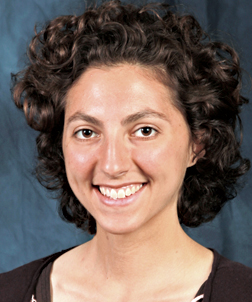Pitt Chancellor’s Scholar Wins Udall Scholarship
 Keely McCaskie
Keely McCaskieUniversity of Pittsburgh junior and Chancellor’s Scholar Keely McCaskie—who is working toward a Bachelor of Philosophy degree in international area studies with a concentration in sustainability in Latin America in Pitt’s University Honors College and bachelor’s degrees in environmental studies and in sociology in the University’s Kenneth P. Dietrich School of Arts and Sciences—has received a Morris K. Udall Scholarship, established by Congress in 1992 to honor former Arizona Congressman Morris K. Udall (1922-98). McCaskie’s excellent academic record and research on the environment helped her earn the award.
“The highly competitive Udall Scholarship recognizes outstanding student leaders who, through their breadth of study, interests, and activities, have exemplified exceptional commitment to environmental, tribal public policy, and Native American health care,” said Pitt Chancellor Mark A. Nordenberg. “Chancellor’s Scholar Keely McCaskie is the perfect choice for this prestigious award. We congratulate her and applaud her contributions to environmental issues.”
“Keely is a remarkable student,” said Edward M. Stricker, dean of the University Honors College, Distinguished University Professor of Neuroscience, and Bernice L. and Morton S. Lerner Chair at Pitt. “She’s a strong, articulate advocate for social and environmental justice that is achieved by change through empowerment. She possesses an extraordinary ability to find allies who share her vision that the people most impacted by environmental policy decisions should be listened to.”
McCaskie’s career goal is to lead initiatives in the nonprofit sector that build capacities of communities facing disproportionate environmental burdens and to advocate for policies that more equally represent them.
As a Pitt sophomore and intern at the Steinbrenner Institute for Environmental Education and Research at Carnegie Mellon University, McCaskie conducted the self-designed research study “Green Jobs for Lower Income Communities: Obstacles and Solutions.” She also assessed the MOVE-IT green jobs training program implemented by Heritage Community Initiatives in the low-income borough of Braddock, Pa. In focus groups, interviews, and surveys, McCaskie talked one-on-one with 30 trainees, the majority of whom were unemployed. McCaskie said she learned that “green” solutions must be based in the understanding of community members because they know best the needs and assets of their community.
During the summer of 2011, McCaskie volunteered as an intern for the Indigenous Environmental Network (IEN) in Flagstaff, Ariz., interviewing people in 40 Native American communities across the United States and Canada about such energy developments as coal operations, oil refining, and uranium mining on their lands. The profiles she gathered will be used in an IEN report to the Environmental Protection Agency. McCaskie also wrote the Climate Justice and Indigenous Peoples Training Manual, which details activities to introduce audiences to climate change, its impact on Native American communities, and ways to develop just solutions. In addition, she led workshops at the 16th annual Protecting Mother Earth Gathering in North Dakota attended by 800 people. IEN will continue to use the manual in affected communities.
McCaskie spent Fall Term 2011 in Ecuador on a study-abroad culture and development program. A result of that experience is the research report titled “Redefining Sustainable Development: Case Study of a Hydroelectric Dam.”
Active in public service, McCaskie founded and served as president of Student Allies Intergroup Dialogue, an organization that hosted workshops for students about social injustice and oppression. She is vice president, community outreach chair, and political action vice chair of the Campus Women’s Organization and a volunteer for Planned Parenthood of Western Pennsylvania, and she was a community liaison for the Free the Planet Environmental Group and head campus organizer for the Students in Solidarity with Service Workers campaign. She serves as a Spanish translator and tutor at Pitt’s Falk School, a laboratory school for educating students from kindergarten through 8th grade and developing new and innovative practices and educational theory.
Among McCaskie’s honors are a 2010 Outstanding First Year Student Leader Award, a 2011 Mellon Foundation Award, and a 2010-11 People for the American Way Fellowship.
McCaskie, a native of Wildwood, Mo., says she is committed to the realization of justice as a central component of environmental policy.
Other Stories From This Issue
On the Freedom Road

Follow a group of Pitt students on the Returning to the Roots of Civil Rights bus tour, a nine-day, 2,300-mile journey crisscrossing five states.
Day 1: The Awakening
Day 2: Deep Impressions
Day 3: Music, Montgomery, and More
Day 4: Looking Back, Looking Forward
Day 5: Learning to Remember
Day 6: The Mountaintop
Day 7: Slavery and Beyond
Day 8: Lessons to Bring Home
Day 9: Final Lessons

